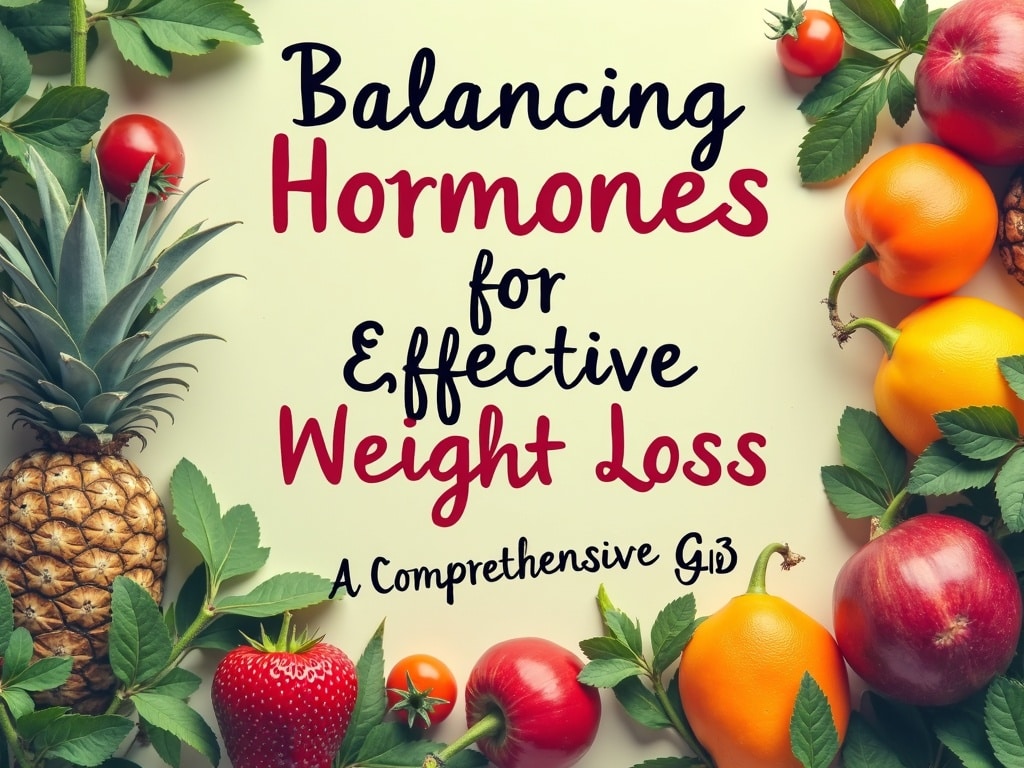Balancing Hormones for Effective Weight Loss: A Comprehensive Guide
Have you ever felt like you're doing everything right – eating a balanced diet, exercising regularly – yet the scale refuses to budge? Or worse, it creeps upwards? While calorie counting and workouts play a role in weight management, a hidden force often dictates our body's ability to shed or store fat: our hormones. These powerful chemical messengers influence everything from appetite and metabolism to mood and fat distribution. When they're out of whack, even the most diligent weight loss efforts can be sabotaged. Understanding how to balance your hormones is a crucial, often overlooked, key to achieving sustainable and effective weight loss.
The Hormonal Symphony of Weight
Think of your hormones as musicians in an orchestra. When they play in harmony, the music (your body's functions) flows smoothly. But when one instrument is out of tune, the entire performance suffers. Several hormones are particularly influential when it comes to weight management:
- Insulin: This hormone regulates blood sugar. Insulin resistance, where your cells become less responsive to insulin, can lead to elevated blood sugar levels, increased fat storage, and ultimately, weight gain.
- Leptin: Known as the satiety hormone, leptin signals to your brain that you're full. Leptin resistance, often seen in individuals with obesity, diminishes this signal, leading to overeating.
- Ghrelin: The hunger hormone, ghrelin stimulates appetite. Imbalances can cause increased cravings and make it difficult to stick to a healthy eating plan.
- Cortisol: The primary stress hormone, cortisol, can promote fat storage, especially around the abdomen, when chronically elevated.
- Thyroid hormones (T3 and T4): These hormones regulate metabolism. Hypothyroidism (underactive thyroid) can slow down metabolism, leading to weight gain and difficulty losing weight.
- Estrogen: In women, estrogen influences fat distribution and metabolism. Declining estrogen levels during menopause can contribute to weight gain, particularly around the midsection.
- Testosterone: While often associated with men, testosterone plays a role in muscle mass and metabolism in both sexes. Low testosterone levels can contribute to reduced muscle mass and increased fat storage.
Identifying Hormonal Imbalances
Recognizing the signs of hormonal imbalance is the first step towards addressing them. Common symptoms include:
- Unexplained weight gain or difficulty losing weight
- Fatigue and low energy levels
- Mood swings, anxiety, or depression
- Sleep disturbances
- Changes in appetite or cravings
- Digestive issues
- Irregular menstrual cycles (in women)
- Hair loss or skin problems
If you experience several of these symptoms, it's a good idea to consult with a healthcare professional. They can order blood tests to assess your hormone levels and identify any imbalances.
Strategies for Balancing Hormones and Promoting Weight Loss
Fortunately, you can take several proactive steps to balance your hormones naturally and support healthy weight loss:
1. Nourish Your Body with a Hormone-Supportive Diet
What you eat has a profound impact on your hormones. Focus on:
- Whole, unprocessed foods: Prioritize fruits, vegetables, lean protein, and whole grains. These foods provide essential nutrients and support overall health.
- Healthy fats: Include sources of omega-3 fatty acids, such as fatty fish (salmon, tuna, mackerel), flaxseeds, and chia seeds. These fats are crucial for hormone production and regulation. Avocados and nuts are also great options.
- Fiber-rich foods: Fiber helps regulate blood sugar levels and promote satiety. Excellent sources include vegetables, fruits, legumes, and whole grains.
- Protein at every meal: Protein helps stabilize blood sugar and keeps you feeling full and satisfied.
2. Minimize Processed Foods, Sugar, and Refined Carbohydrates
These foods can wreak havoc on your hormones, leading to insulin resistance, inflammation, and weight gain. Limit or eliminate:
- Sugary drinks: Sodas, juices, and sweetened beverages are loaded with sugar, which can spike blood sugar and lead to insulin resistance.
- Processed snacks: Chips, cookies, and other processed snacks are often high in unhealthy fats, sugar, and sodium, which can disrupt hormone balance.
- Refined carbohydrates: White bread, pasta, and rice are quickly digested, leading to rapid spikes in blood sugar.
3. Manage Stress Effectively
Chronic stress can elevate cortisol levels, leading to weight gain and other health problems. Find healthy ways to manage stress, such as:
- Regular exercise: Physical activity can help lower cortisol levels and improve mood.
- Mindfulness and meditation: These practices can help calm the mind and reduce stress.
- Spending time in nature: Studies have shown that spending time in nature can lower cortisol levels and improve overall well-being.
- Adequate sleep: Aim for 7-9 hours of quality sleep per night. Sleep deprivation can disrupt hormone balance and increase stress.
4. Prioritize Sleep
Sleep is crucial for hormone regulation. Lack of sleep can disrupt cortisol, insulin, and ghrelin levels, making it harder to lose weight.
Aim for 7-9 hours of quality sleep each night. Establish a regular sleep schedule, create a relaxing bedtime routine, and ensure your bedroom is dark, quiet, and cool.
5. Exercise Regularly, but Don't Overdo It
Regular exercise is beneficial for hormone balance and weight loss. Aim for a combination of cardiovascular exercise (like running, swimming, or cycling) and strength training. However, excessive exercise can actually increase cortisol levels, so it's important to find a balance.
Listen to your body and avoid overtraining. Include rest days in your workout schedule to allow your body to recover.

6. Consider Supplements (with Caution and Professional Guidance)
Certain supplements may help support hormone balance, but it's important to talk to your doctor before taking any new supplements. Some options that are sometimes helpful include:
- Magnesium: This mineral plays a role in hundreds of bodily functions, including hormone production and regulation.
- Vitamin D: Vitamin D deficiency is common and can affect hormone balance, particularly insulin and thyroid hormones.
- Omega-3 fatty acids: These fats are essential for hormone production and can help reduce inflammation.
- Probiotics: Probiotics can improve gut health, which can indirectly affect hormone balance.
- Adaptogens: Herbs like ashwagandha and rhodiola may help the body adapt to stress and balance cortisol levels.
7. Optimize Gut Health
Your gut microbiome plays a significant role in hormone regulation. An unhealthy gut can disrupt hormone balance and contribute to weight gain. Support a healthy gut by:
- Eating a variety of fiber-rich foods: Fiber feeds the beneficial bacteria in your gut.
- Taking a probiotic supplement: Probiotics can help replenish the beneficial bacteria in your gut.
- Fermented foods: Include fermented foods like yogurt (with live cultures), kefir, sauerkraut, and kimchi in your diet.
- Limiting processed foods, sugar, and artificial sweeteners: These can harm your gut microbiome.
8. Limit Exposure to Endocrine Disruptors
Endocrine disruptors are chemicals that can interfere with hormone function. They are found in many everyday products, such as plastics, pesticides, and personal care products. Minimize your exposure by:
- Using glass or stainless steel containers instead of plastic: Especially when heating food.
- Choosing organic produce whenever possible: To reduce exposure to pesticides.
- Using natural and fragrance-free personal care products: Many conventional products contain endocrine disruptors.
- Filtering your water: To remove contaminants.
9. Regular Check-ups and Testing
If you suspect a hormonal imbalance, it's essential to consult with a healthcare professional for proper diagnosis and treatment. They can order blood tests to assess your hormone levels and recommend appropriate interventions, which may include lifestyle changes, medication, or hormone therapy.
The Importance of a Holistic Approach
Balancing hormones for effective weight loss is not a quick fix; it's a journey that requires a holistic approach. It's about nourishing your body, managing stress, prioritizing sleep, and making sustainable lifestyle changes. It's also about understanding that weight loss is not just about calories in versus calories out, but also about the complex interplay of hormones that regulate your metabolism, appetite, and fat storage. By addressing hormonal imbalances, you can unlock your body's natural ability to shed excess weight and achieve lasting health and well-being. Remember to be patient with yourself and celebrate your progress along the way.
Beyond the Scale: The Bigger Picture
While weight loss may be your initial goal, balancing your hormones offers benefits that extend far beyond the number on the scale. You may experience increased energy levels, improved mood, better sleep, and enhanced overall health. By focusing on creating a healthy and harmonious internal environment, you're not just losing weight; you're investing in a healthier and happier you.

